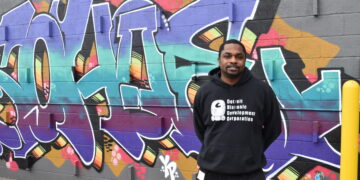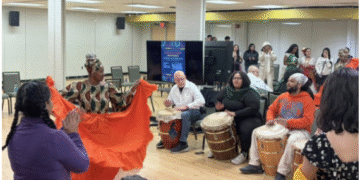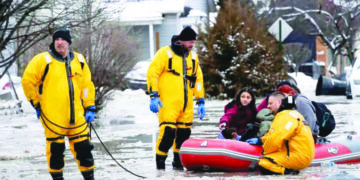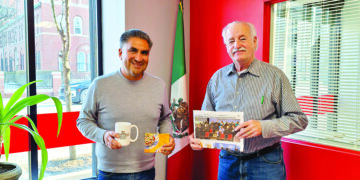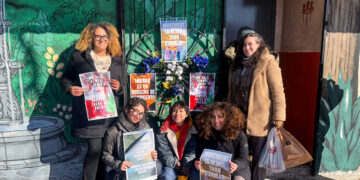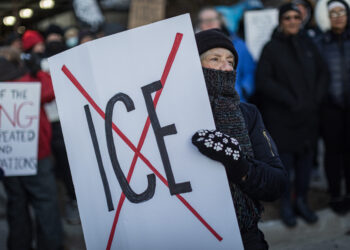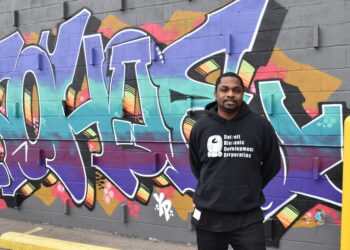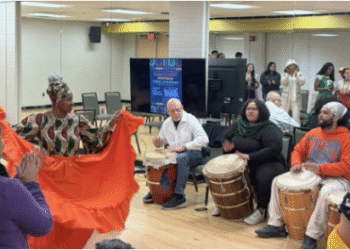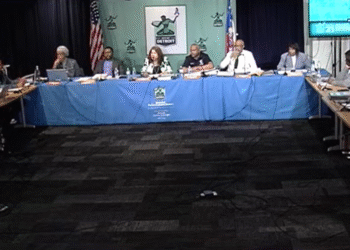El plan de la administración Trump para deportar a millones de inmigrantes que viven en el país sin permiso está muy lejos de cumplir sus objetivos iniciales en sus primeras semanas. Sin embargo, ha habido un aumento en redadas de inmigración en varias ciudades, incluyendo Los Ángeles y Miami, desde que Trump asumió el cargo.
Tras la inauguración de Trump, los rumores sobre agentes del Servicio de Inmigración y Control de Aduanas (ICE) patrullando las calles o apareciendo en iglesias y escuelas se han propagado en redes sociales y aplicaciones de mensajería, generando olas de pánico en comunidades de inmigrantes de costa a costa.
Cuando comparto mi investigación sobre los efectos de las políticas migratorias de EE. UU., encuentro que la mayoría de las personas entiende intuitivamente cómo una deportación puede trastornar la vida de alguien. De hecho, la investigación muestra que la deportación, y el riesgo de deportación, impactan a más que solo a la persona deportada.
La deportación de inmigrantes a menudo separa a las personas de sus familias, los exilia a países que no sienten como su hogar y los deja en la pobreza, con pocas perspectivas de empleo.
Los inmigrantes que son deportados también enfrentan estigmas sociales que conducen a un mayor aislamiento y a condiciones de salud mental, incluyendo depresión, ansiedad y riesgo de suicidio.
Un asunto familiar
Los inmigrantes indocumentados suelen pertenecer a familias de estatus migratorio mixto, donde al menos un miembro tiene permiso legal para estar en el país o es ciudadano. En algunos casos, estas familias sienten presión para abandonar EE. UU. juntos si un miembro es deportado. Investigadores llaman a este fenómeno “deportación de facto”. Esto afecta especialmente a niños nacidos en EE. UU. cuyos padres son deportados.
Expertos legales legales argumentan que deportar a los padres de estos jóvenes ciudadanos estadounidenses viola los derechos de ciudadanía de estos niños. Aunque estos niños son ciudadanos, las deportaciones de sus padres los expulsan del país y los alejan de las vidas que habrían tenido en los EE. UU.
En otros casos, las familias se separan cuando una madre, un padre u otro tutor adulto es deportado. Esto es especialmente cierto para los inmigrantes que son deportados a lugares peligrosos. Las familias también es probable que se separen si un miembro de la familia requiere atención médica especializada por una discapacidad o enfermedad crónica.
Pero no son solo las deportaciones reales las que causan daño.
El miedo a la deportación
Incluso cuando los inmigrantes no enfrentan un riesgo inmediato de deportación, la manera en que viven sus vidas está moldeada por la amenaza de ser expulsados. En climas políticos hostiles, incluido el momento actual en los EE. UU., los inmigrantes sienten el riesgo de deportación de manera aguda.
Algunos investigadores llaman al miedo a la deportación ‘deportabilidad’. Este sentimiento tiene un efecto paralizante, desalentando a los inmigrantes de realizar las actividades cotidianas que de otro modo harían. Hasta ahora, el miedo de los inmigrantes es probablemente desproporcionado respecto al riesgo de deportación. Pero la amenaza es tan grande que los inmigrantes y sus familias han trastocado sus vidas.
Propietarios de negocios, maestros y líderes religiosos de todo el país han notado la ausencia de inmigrantes en vecindarios que normalmente son animados y que ahora se sienten desiertos.
En algunos casos, los inmigrantes mantienen a sus hijos en casa y no los llevan a la escuela. Otros evitan ir a citas médicas o retrasan ir al hospital.
La hostilidad hacia los inmigrantes también tiene un efecto paralizante en la expresión cultural.
La investigación muestra que los inmigrantes latinos que temen la deportación o el prejuicio antiinmigrante se sienten forzados a asimilarse. Evitan hablar español o su idioma indígena, como el quechua o el náhuatl, en público, e incluso pueden dudar en enseñárselo a sus propios hijos.
De manera similar, puede parecer peligroso tocar música o participar en tradiciones culturales.
Efectos colaterales
La investigación también ha encontrado que la amenaza de deportación hace que los inmigrantes duden en reportar condiciones peligrosas en el trabajo. Dado que los inmigrantes están sobrerrepresentados en industrias peligrosas, como la construcción y el procesamiento de carne, esto puede llevar a un mayor riesgo de lesiones o incluso de muerte en el trabajo.
Debido a que las agencias locales de seguridad cada vez más cooperan con las autoridades federales de inmigración, los inmigrantes también pueden evitar acudir a la policía, incluso cuando son víctimas de crímenes violentos.
Incluso en ciudades donde las agencias locales de seguridad se niegan a trabajar de cerca con ICE, la percepción de que podrían hacerlo crea miedo en las comunidades inmigrantes y lleva a las personas a subutilizar los programas y servicios públicos.
Las personas que tienen permiso para estar en el país también tienen miedo
El miedo a la aplicación de las leyes de inmigración también puede extenderse a una persona que hable un idioma extranjero, sea una persona de color o, de alguna manera, parezca estar en el país sin permiso.
Quizás el ejemplo más llamativo de esto consiste en informes recientes de que ciudadanos nativos americanos que viven en estados del suroeste como Arizona han sido interrogados cada vez más por ICE. En respuesta, el presidente de la Nación Navajo, Buu Nygren, ha aconsejado a las personas que lleven pruebas de su ciudadanía estadounidense.
Los temores de los ciudadanos estadounidenses no blancos de ser deportados no son sin precedentes.
En la década de 1950, muchos ciudadanos estadounidenses de ascendencia mexicana fueron deportados bajo la operación de deportación masiva del presidente Dwight Eisenhower. Trump atribuye el programa de Eisenhower, conocido oficialmente como ‘Operation Wetback,’ por el insulto racista, como inspiración para sus actuales planes de deportación masiva.
Más de medio siglo después, la Oficina de Responsabilidad Gubernamental de EE. UU. informó que entre 2015 y 2020, ICE probablemente arrestó a 674 ciudadanos estadounidenses, detuvo a 121 y deportó a 70 de ellos.
Un sentimiento de desesperación
No es sorprendente que las políticas y amenazas antiinmigrantes puedan generar sentimientos de desesperanza entre los inmigrantes. El miedo a la deportación puede llevar a problemas significativos de salud mental para los inmigrantes y sus seres queridos, que van desde condiciones como ansiedad, depresión y trastorno de estrés postraumático hasta la pérdida de confianza en los demás y el aislamiento social.
Los niños experimentan miedo y confusión sobre el futuro de sus vidas y el de sus familias.
La desesperanza puede llevar a los inmigrantes a abandonar el país por su propia voluntad. Esto puede ocurrir porque no ven un futuro para sí mismos en los EE. UU. De manera similar, los inmigrantes que son detenidos por las autoridades gubernamentales pueden aceptar órdenes de salida voluntaria en lugar de luchar para permanecer en el país.
Algunas consecuencias del miedo a la deportación y la hostilidad antiinmigrante son fáciles de ver, como cuando los niños faltan a la escuela.Otras, como retrasar citas médicas, pasar hambre en lugar de ir al banco de alimentos o tolerar el abuso en lugar de buscar ayuda, son más difíciles de observar, y sus efectos negativos pueden no ser evidentes durante años.

Kristina Fullerton Rico es investigadora del Centro de Justicia Racial de la Escuela Ford de Políticas Públicas. Su investigación examina los impactos de las políticas de inmigración de los Estados Unidos que llevan a los inmigrantes no autorizados y a sus familias a soportar la separación a largo plazo.
Deportation fears create ripple effects for immigrants and their communities
The Trump administration’s plan to deport millions of immigrants living in the country without permission is falling far short of its initial goals in its first few weeks.
But there has been an increase in immigration raids in multiple cities, including Los Angeles and Miami, since Trump took office.
After Trump’s inauguration, rumors of Immigration and Customs Enforcement agents roaming the streets or showing up at churches and schools have spread on social media and messaging apps, sending waves of panic in immigrant communities from coast to coast.
When I share my research on the effects of U.S. immigration policies, I find that most people intuitively understand how being deported can upend someone’s life.
In fact, research shows that deportation, and the risk of deportation, impacts more than just the person who is deported.
Deporting immigrants often separates individuals from their families, exiles them to countries that don’t feel like home, and leaves them poor, with few job prospects.
Immigrants who are deported also face social stigmas that lead to further isolation and mental health conditions, including depression, anxiety and risk of suicide.
A family matter
Immigrants in the country without permission tend to belong to mixed-immigration-status families, meaning that at least one family member has legal permission to be in the country or has citizenship.
In some cases, mixed-status families feel pressure to leave the U.S. together if one family member is deported.
Researchers call this phenomenon “de facto deportation.” It frequently affects young, U.S.-born children whose parents are deported.
Legal scholars argue that deporting the parents of these young U.S. citizens violates these children’s citizenship rights. Though these children are citizens, their parents’ deportations push them out of the country and away from the lives they would have had in the U.S.
In other cases, families separate when a mother, father or other adult guardian is deported. This is especially true for immigrants who are deported to dangerous places. Families are also likely to separate if a family member requires specialized medical care for a disability or chronic illness.
But it is not just actual deportations that cause harm.
The fear of deportation
Even when immigrants do not face an immediate risk of deportation, the way they live their lives is shaped by the threat of removal.
In hostile political climates, including the current moment in the U.S., immigrants feel the risk of deportation acutely.
Some researchers call the fear of deportation “deportability.” This feeling has a chilling effect, discouraging immigrants from the everyday activities they would otherwise do.
So far, immigrants’ fear is likely disproportionate to the risk of deportation. But the threat looms so large that immigrants and their families have upended their lives.
Business owners, teachers and religious leaders across the country have noticed immigrants’ glaring absence in neighborhoods that are usually bustling and now feel deserted.
In some cases, immigrants are keeping their children home from school. Others avoid going to doctor’s appointments or delay going to the hospital.
Hostility toward immigrants also has a chilling effect on cultural expression.
Research shows that Latino immigrants who fear deportation or anti-immigrant prejudice feel coerced to assimilate. They avoid speaking Spanish or their Indigenous language, like Quechua or Náhuatl, in public, and may even hesitate to teach it to their own children.
Similarly, it can feel dangerous to play music or partake in cultural traditions.
Spillover effects
Research has also found that the threat of deportation makes immigrants hesitant to report dangerous conditions at work. Since immigrants are overrepresented in dangerous industries, like construction and meatpacking, this can lead to a higher risk of being injured or even dying on the job.
Because local law enforcement agencies increasingly cooperate with federal immigration authorities, immigrants may also avoid going to the police – even when they are victims of violent crimes.
Even in cities where local law enforcement agencies refuse to work closely with ICE, the perception that they might be creates fear in immigrant communities and leads people to underutilize public programs and services.
People who have permission to be in the country are also afraid
The fear of immigration enforcement can also extend to a person who speaks a foreign language, is a person of color, or otherwise seems like they might be in the country without permission.
Perhaps the most striking example of this consists of recent reports that Native American citizens living in Southwest states like Arizona have been increasingly questioned by ICE. In response, Navajo Nation President Buu Nygren has advised people to carry proof of their U.S. citizenship.
Nonwhite U.S. citizens’ fears of being deported are not unprecedented.
In the 1950s, many U.S. citizens of Mexican ancestry were deported under President Dwight Eisenhower’s mass deportation operation. Trump credits Eisenhower’s program, officially called “Operation Wetback,” after the racist slur, for inspiring his current mass deportation plans.
More than half a century later, the U.S. Government Accountability Office reported that between 2015 and 2020, ICE likely arrested 674 U.S. citizens, detaining 121 and deporting 70 of them.
A sense of despair
Not surprisingly, anti-immigrant policies and threats can elicit feelings of hopelessness among immigrants. The fear of deportation can lead to significant mental health problems for immigrants and their loved ones, ranging from conditions like anxiety, depression and post-traumatic stress disorder to a loss of trust in others and social isolation.
Children experience fear and confusion about the future of their lives and that of their families.
Hopelessness can lead to immigrants leaving the country on their own accord. This can happen because immigrants see no future for themselves in the U.S.
Similarly, immigrants who are detained by government authorities may agree to voluntary departure orders rather than fighting to remain in the country.
Some consequences of the fear of deportation and anti-immigrant hostility are easy to see, like when children miss school.
Others – delaying doctor’s appointments, going hungry instead of going to the food bank, tolerating abuse instead of seeking help – are harder to observe, and their negative effects may not be evident for years.

Kristina Fullerton Rico is a Research Fellow at the Center for Racial Justice at the Ford School of Public Policy. Her research examines the impacts of U.S. immigration policies that lead unauthorized immigrants and their families to endure long-term separation.


